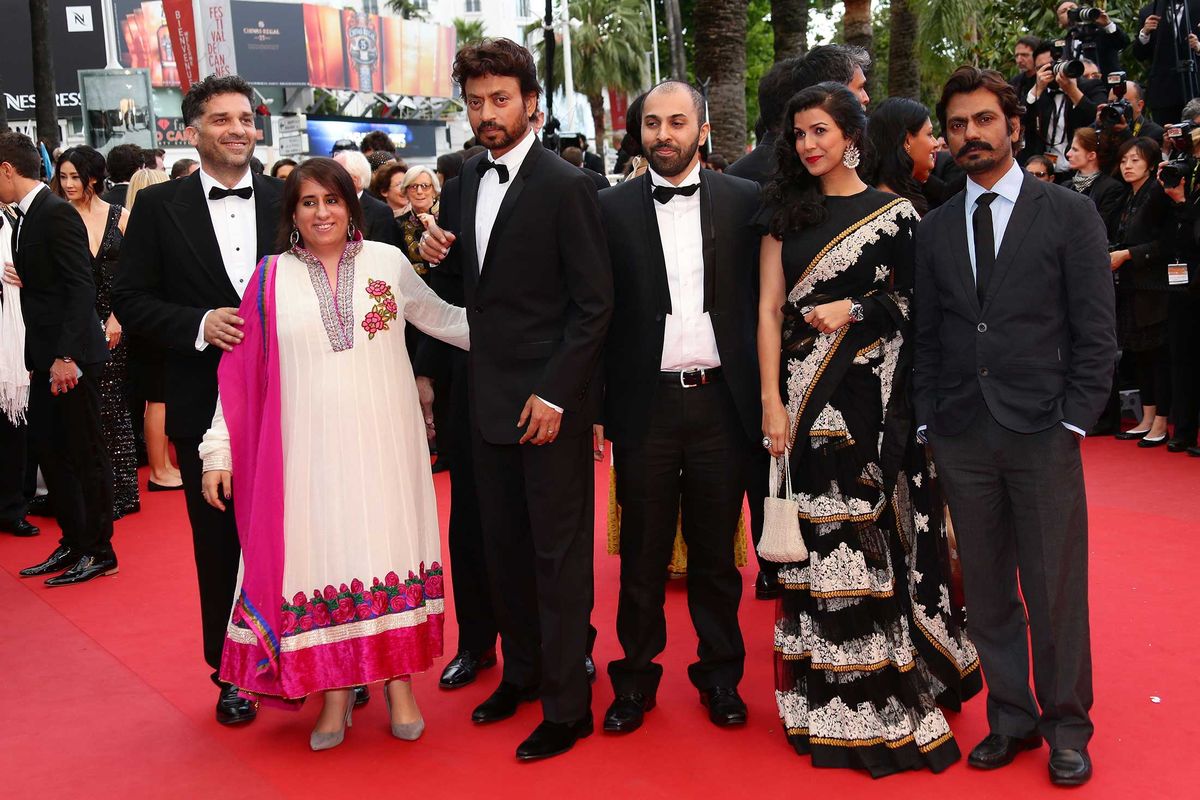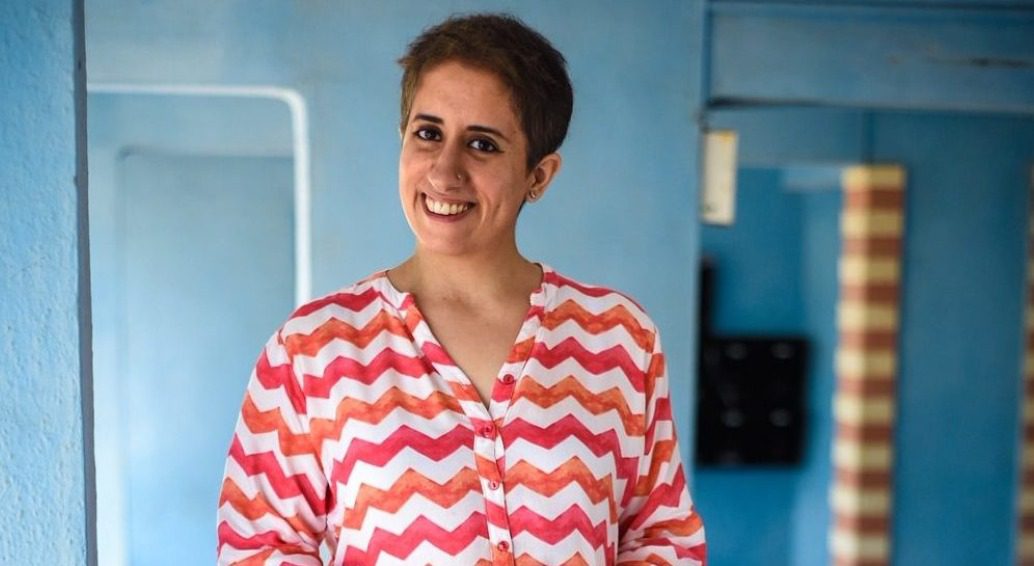(July 26, 9:40 am) “And the Oscar goes to Period. End of Sentence for Best Documentary Short Film.” As director Rayka Zehtabchi and producer Melissa Berton rose to receive the trophy on February 25, 2019, co-producer Guneet Monga was cheering the loudest sitting at the Dolby Theatre in Hollywood. And why not? This was her first win at the Academy Awards. Years of hard work, persuasion, conviction found a fitting culmination.
Guneet Monga is one of those rare firebrands in Indian cinema that puts bucks behind offbeat stories. It’s powerful storytelling that attracts Monga, and she makes sure to bring both arthouse films as well as commercial ones to international film festivals.
Her persuasiveness to bring Indian cinema to the global map is reaping fruits: Think of with films such as Gangs of Wasseypur, Masaan, and The Lunchbox making it to Cannes line-up.
In April, Monga received the second-highest civilian French honor – Knight of the Order of Arts and Letters – for her contribution to world cinema through Indo-French productions and “her relentless work towards women empowerment.”
But behind the successful career has been a story of struggle, perseverance, and a never-give-up attitude.
Childhood Struggles
Born and brought up in Delhi in a Punjabi family, Guneet Monga witnessed domestic violence within her home at the hands of her relatives. On one such violent night, she along with her parents left their ancestral home and fled for their lives. Her mom wanted a home of their own, and Monga vowed to buy her their dream home. To help her dad financially, Monga took up every possible job – a DJ, an insurance agent, a rally car driver, and a property saleswoman. But it was at a movie set that Monga found her true calling.
After finishing her master’s degree in mass communication, she started interning with her mom’s friend who was into the production of international films. Monga realized that this was something she wanted to do for the rest of her life. She borrowed ₹50 lakh from her neighbor in exchange for a business plan she made for him and took the first train to Mumbai.
Train to Bollywood
She met people at malls and food courts asking if they had a story to tell. It was then that she found an exciting script in the form of Say Salaam India, about four guys and their passion for cricket. Sure of hitting a jackpot with a film like this in a cricket-crazy country, Monga released the film in 2007. However, the film tanked badly as it was released a few days after the Indian cricket team crashed out of the World Cup in the Caribbean.
She was down but not out. Because she had a plan – to showcase the film in schools at a nominal fee. In few months, she recovered her money. This taught her the biggest lesson so far: There is always an audience for every film.
In 2008, she made Vinay Pathak-starrer Dasvidaniya under her own banner, Sikhya Entertainment, which turned out to be a sleeper-hit. With a few films to her credit, Monga was ready to buy her mom her dream home. But destiny had a different plan. Her mom was diagnosed with cancer and passed away. Within a few months, her father succumbed to kidney disease. She was just 24 then.
View this post on Instagram
Struggling with grief, Monga returned to Mumbai and immersed herself in work.
Things really began to shift for Monga after her chance meeting with filmmaker Anurag Kashyap, who went on to become her boss and mentor. Basking in the success of Dev D, Kashyap had become the face of indie films in India. Every aspiring newcomer wanted Kashyap to take them under their wings. Monga’s work caught his eye and he took her onboard for his production company Anurag Kashyap Films (AKFPL).
In a conversation with Outlook Business, Monga said,
“Anurag’s faith gave me wings. At 25, and two years after joining the company, he asked me to co-own the company with him. I had produced two films with the company and I knew I could do it. But it was his belief in me that really pulled me through.”
Ageism – a bigger bias
Monga was breaking deals as a young 25-year-old producer, and ageism did catch up with her many times. “People get very intimidated by a young, strong, opinionated woman. Age was a bigger hindrance than being a woman. During big deals, it was difficult to get beyond that. I just decided to never acknowledge the difference in age,” she added.
Monga wanted her work to talk for itself and that’s what she was doing at international film festivals. She was meeting the biggies in independent cinema and promoting her films.
“I always say that there are two ways of entering this industry —one is to work with the biggies and the other is to do something so disruptive that people sit up and take notice. When you do something disruptive, you’re always doubting yourself or feeling isolated. You’re worried the projects will never see the light of day. But when you work for yourself, the day doesn’t end,” she added.
Innings with Indie films
But it was the 2012 gangster drama Gangs of Wasseypur that catapulted Monga to the forefront. The two-part series not only made ₹23 crore but also attained a cult status with a fam following to this day. This film took Monga to Cannes Film Festival, and as they say, the rest is history.
She kept backing interesting scripts such as Aiyyaa (2012) and Shahid (2013). But it was Ritesh Batra’s 2013 film The Lunchbox (an official co-production between India, France and Germany) that earned her another milestone. The film earned a BAFTA nomination, grossed $7.4 million worldwide, and went to become India’s official entry to the 2015 Oscars.

Guneet Monga with The Lunchbox actors Irrfan Khan, Nimrat Kaur, and Nawazuddin Siddiqui at Cannes.
However, the blinding success of The Lunchbox left Monga depressed. She describes that period as one of self-doubt.
“My peers termed the success of the film as a fluke. I felt lost about what it was that I wanted to do. I had to take that break and see if I wanted to be a part of the industry,” she told India Today.
Monga used this break to learn Kalarippayattu, to go for detox, and travel the world in search of the answers. The 37-year-old wasn’t ready to give up and went right back into the business of making films. “I believe that if you put something out there, it will manifest itself into something bigger. There is a difference between faith and blind faith. If you really love what you do, there is nothing stopping you,” she added.
With films like Masaan, Haraamkhor, and Period. End of Sentence to her credit. Monga became one of the first Indian producers to join the Producer branch of the Academy of Motion Picture Arts and Sciences in 2018. The very same year, Variety named her as one of the 50 women from entertainment ‘doing extraordinary things on the worldwide stage’.
However, her achievements got a dismissive response from her industry peers.
“They said I am there to tick a box, the diversity one, the woman one, the inclusivity one. When The Lunchbox succeeded as a true crossover project, they said it was luck. When our film, Masaan, went to Cannes, they still said the same. But I’m not bothered. I work bloody hard. My work is for all to see. Constantly putting Indian films on the map doesn’t happen by fluke, it takes a lot of relentlessness, a lot of hard work,” she told HuffingtonPost.
The Oscar Glory
But it was her 2019 documentary Period. End of Sentence that earned Monga her first Oscar. The film based on the stigma around menstruation in India made waves at the 91st Academy Awards. Even Hollywood actors like Reese Witherspoon lauded the film’s Oscar win.
View this post on Instagram
“A period should end a sentence , not a girls education” – best quote of the night ✨#OSCARS @NoShamePeriod #bestdocshort
— Reese Witherspoon (@ReeseW) February 25, 2019
After dipping her toes in independent films and mainstream Bollywood, Monga ventured into Tamil cinema with Soorarai Pottru based on the life of Captain GR Gopinath who found India’s first low-cost airline Air Deccan.
She is also keen to discover and amplify the works and voices of women directors with Indian Women Rising, a collective started by Monga, producer Ekta Kapoor, and filmmaker Tahira Kashyap.
“There was a lot of judgment when my films didn’t have distribution. I felt unprotected when I didn’t have support in India. I wish there was something like Indian Women Rising when I was starting out.”
Editor’s Take
Earning one’s stripes as a path-breaking producer in an industry that usually ignores the arthouse world is no easy feat, but Oscar award-winning producer Guneet Monga shattered all the stereotypes bit by bit. With films such as Gangs of Wasseypur to her credit at the age of 25, Monga had announced her arrival with a big bang. The Lunchbox was a pathbreaker on many counts: It was the first film to be made under the 1985 Indo-French film co-production treaty. Monga is one of those rare producers who’s a regular at international film festivals and takes up every chance to make a global impact with Indian cinema.
Find more fascinating Stories

